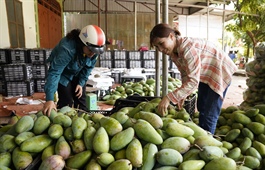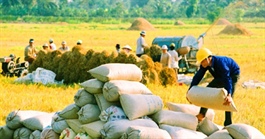Vietnamese durian enters China via official channels
Vietnamese durian enters China via official channels
Durian will be the 11th Vietnamese fruit to enter the Chinese market via official channels, following a protocol signed by Minister of Agriculture and Rural Development Le Minh Hoan on Monday.

The protocol on phytosanitary requirements for Vietnamese durian exported to China is effective within three years. It will be sent to the General Administration of Customs of China and published on its portal, together with lists of eligible durian growing areas and packing facilities of Viet Nam.
Vietnamese durian will be allowed to officially be exported to China after the protocol is publicised. Earlier, dragon fruit, watermelon, lychee, longan, banana, mango, jackfruit, rambutan, mangosteen and passion fruit from Viet Nam were also allowed to be shipped to China via official channels.
The protocol stipulates that all growing areas registered for export to China must build a quality management and traceability system, apply Good Agricultural Practices (GAP), and ensure conditions such as cleaning the cultivating garden and away from the source of pollution, immediately removing the fallen and rotten fruits.
In addition, they must apply an integrated pest management (IPM) programme, including pest surveillance, chemical or biological control, and other farming practices.
China is still the largest importer of Vietnamese durian, but this fruit is mainly exported to China via border gates. It is estimated that China spends $4.2 billion on importing durian per year, of which imports from Thailand account for 60 per cent.
Viet Nam's 2021 durian output was estimated at 600,000 tonnes, up 15 per cent year-on-year, according to MARD's Department of Crop Production.
The country now has about 50,000-60,000ha of durian growing areas for official export, mainly in Tay Ninh, Binh Duong, Dong Nai, Binh Phuoc, Tien Giang and Dak Lak provinces.




























